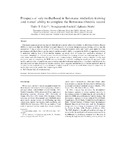Prospects of safe motherhood in Botswana: midwifery training and nurses' ability to complete the Botswana obstetric record
Date
2003-01-01Author
Fako, T.T.
Forcheh, N.
Ncube, E.
Publisher
Elsevier Ltd. www.elsevier.com/locate/socscimedType
Published ArticleMetadata
Show full item recordAbstract
This paper examines several key factors that determine nurses’ ability to complete the Botswana Obstetric Record
(BOR), an instrument that should help with early diagnosis of problems during pregnancy, labour, delivery and the
puerperium. Using a national sample of 309 nurses working in hospitals, clinics and health posts under the local
government authority in Botswana, the study found that a nurse’s ability to complete the BOR was significantly related
to midwifery training, level of basic nursing training, age group, level of income, job satisfaction, adequacy of
equipment, attendance of refresher courses, overall level of in-service training, reliance on workshops and seminars,
peer reliance and self-reliance for information on new nursing practices. Multivariate analyses indicated that the most
competent nurse in completing the BOR was one trained as a midwife, working in an adequately equipped health
facility, and who often consulted with peers as well as attended workshops and seminars. The study concludes that it is
more important to train all nurses to become midwives than to upgrade enrolled nurses to become registered nurses if
the plan for safe motherhood is to be advanced. Further research is needed to establish the objective competence of
nurses who claim to be comfortable completing the BOR.

